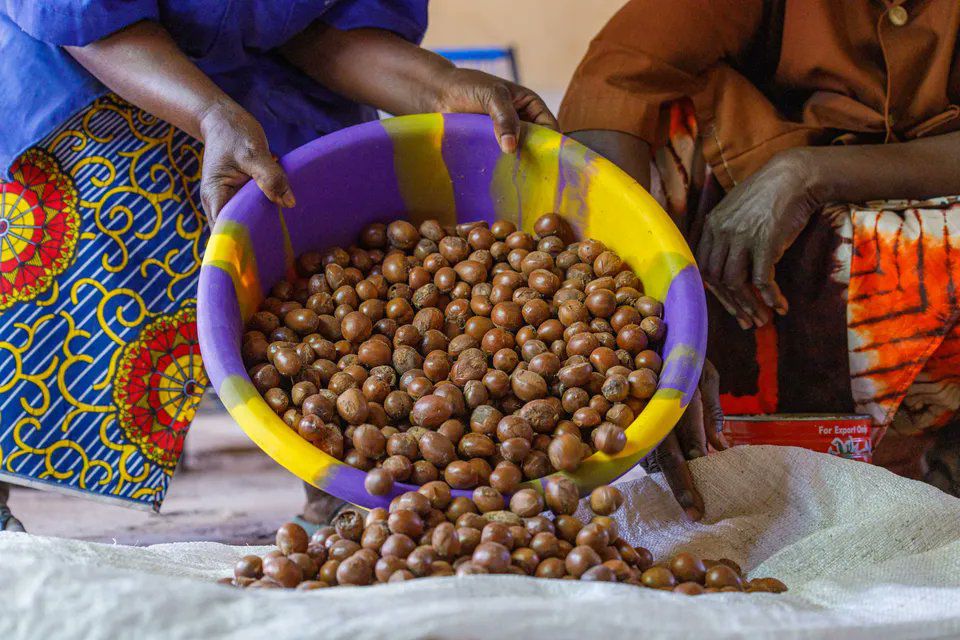In the depths of Nigeria’s villages, hidden within the dense, thick Igala vegetation in Dekina LGA of Kogi State, Ojoma and other women of her age group have been known to wake up early, often before the morning cockerel makes its first crow, slippers slapping dust-stained floors, buckets perched expertly on ọ̀rùka (donut-style wrapped head-ties) as they trot together at dawn to pick fallen Shea nuts beneath broad-leaved trees. For many generations, and indeed, many more to come, these nuts represent more than a snack; they are the source of Shea butter, a thick, brown paste with a woody/earthy smell, which is used as a body lotion for children, as well as the treatment of bruises/injuries. This same product has been known to travel from local markets to luxury shelves in Europe and America. However, Nigeria, despite being one of the world’s largest producers of Shea nuts, has seen itself sidelined to less than one percent of the global Shea market.
As of one week ago, Nigeria’s President, Bola Ahmed Tinubu, intends to rewrite that story.
He announced a six-month ban on the export of raw Shea nuts, insisting that while Nigeria has never lacked the product in commercial quantity, what it lacked was the production of value-added products, which Shea has the potential to offer, which could change the course of an economy that has been besieged by a reform-ridden 26-month tenure so far. His message is straightforward: stop sending our wealth abroad and start adding value at home.
This presents an excellent opportunity to breathe new life into an aspect of the economy that has been neglected for far too long, with the potential to generate more than three times the current revenue. On the face of it, this presents an excellent opportunity to breathe new life into an aspect of the economy that has been neglected for far too long, with the potential to generate more than three times the current revenue. In addition, the prospects for job creation are substantial. On the other hand, the lack of sufficient processing plants and government-backed infrastructure to handle the deluge of products that will be lying fallow for the next six months has seen critics term the move as one without foresight, and one that could backfire, hurting farmers, eroding the sole source of income for Shea farmers, and resulting in the loss of critical foreign exchange.
So, is Nigeria’s “Shea gamble” a masterstroke or a miscalculation?

On paper, the numbers look impressive. Economists have been crunching numbers, postulating that the Nigerian Shea Industry has the capacity to generate US$300 million within six months, and up to US$3 billion by 2027. Tantalizing figures, enough for any Nigerian to get behind the move, but having been victims of these sorts of moves in the past, the skepticism of Nigerians might just be justified.
For example, in 2019 (coincidentally, August of that same year), the Nigerian government, under the leadership of the late President Muhammadu Buhari, implemented a land-border closure to boost local production of rice and other food items. Whilst it recorded some form of improved revenue and a lot of boost to regional agriculture, it rapidly backfired, as prices of essential food items spiked amid supply shortages. Food inflation hit double digits, and supporters of the scheme rapidly recanted their agreement, leaving the government in a bind and ultimately having to succumb to the recommendation of a Presidential committee in December 2020, which proposed a gradual reopening.
Additionally, in the 1980s, the country experimented with bans on raw cocoa. The result was mixed. While some processing industries grew, many farmers suffered losses due to a lack of capacity. Cashew tells a similar story: despite being one of the top producers globally, most Nigerian cashews are still exported raw because local processors cannot handle the volumes.
This, and many more “reforms”, some even undertaken under the current administration, have spanned a national distrust in moves like these, which the majority should naturally celebrate. And when the preparedness of the Nigerian government is put under the microscope, the reasoning of the typical Nigerian becomes clearer.
Will Shea nuts follow the same path, or can Tinubu’s government finally break the cycle?
Beneath the optimism lies anxiety. Take Ojoma, the farmer in Kogi State who has supplied raw Shea nuts to middlemen for years. With the ban in place, she can no longer sell her harvest abroad unless it is processed locally. The challenge? There are not enough processing companies to absorb the sudden glut of nuts in the market.
In 2022, Ghana, Nigeria’s closest competitor in Shea, had over 60 functional processing plants, many of which were linked to global cosmetic brands. Nigeria, by contrast, has less than a dozen large-scale processors, with most of them operating below capacity.
For smallholder farmers, this creates a bottleneck. Prices could crash locally because processors cannot buy everything, leaving farmers worse off than before. Exporters who built supply chains around raw nuts also face disruptions, with contracts abroad now impossible to fulfill legally.
This is where critics sharpen their knives: was the government ready for such a drastic step?
Banning raw exports sounds visionary, but the success depends on what comes next. Does Nigeria have the infrastructure to support large-scale processing? Are there incentives for investors to build factories quickly? Is there a road map for linking farmers to processors, ensuring they don’t get stranded with unsold nuts?
At the moment, the answers are murky. The Ministry of Trade has promised “support packages” for cooperatives and SMEs in the Shea value chain, but details remain vague. Without immediate investment in processing capacity, storage facilities, and logistics, the ban could ultimately prove to be a policy with good intentions but poor execution.
There is also the matter of national pride. For too long, Nigeria has exported raw commodities like crude oil, cocoa, cashew, and now Shea nuts, only to import finished goods at many times the cost. By forcing local value addition, the Tinubu administration is signaling a determination to break this cycle.
Economists refer to this as “import substitution industrialization.” In simpler terms, it means: let’s stop being just a farm for the world, and instead build factories that produce finished goods Nigerians can be proud of. Shea butter for cosmetics, food, and pharmaceuticals has high global demand, and Nigeria could sit at the center of that supply chain.
President Tinubu’s ban on Shea nut exports is more than an agricultural policy; it is a test of Nigeria’s seriousness about industrialization. If implemented with vision and discipline, it could transform the Shea sector into a billion-dollar industry that empowers farmers and boosts the economy. But if rolled out without preparation, which a sudden announcement like this one may prove to be, it risks becoming another well-meaning idea lost in Nigeria’s history of half-finished economic reforms.
Back in Dekina, Ojoma waits. Her baskets of Shea nuts are ready, but the market is uncertain. Will factories rise in time? Will her nuts become part of Nigeria’s billion-dollar dream, or just another chapter of missed opportunities? The answer, as always, will depend on whether policy meets reality.
Samuel Aina

